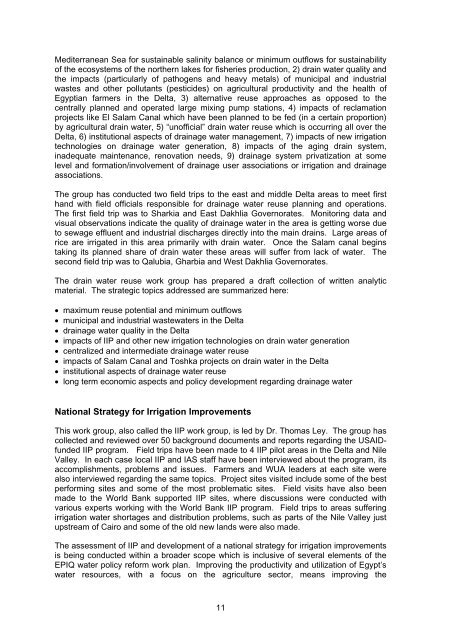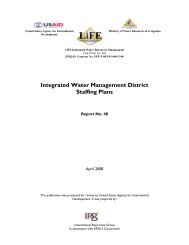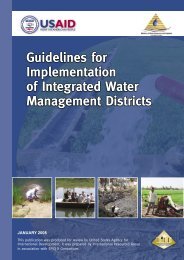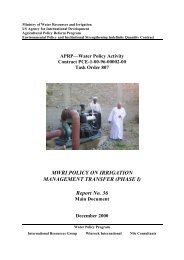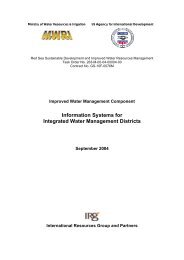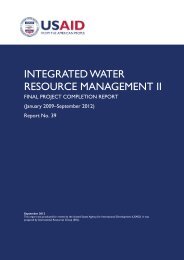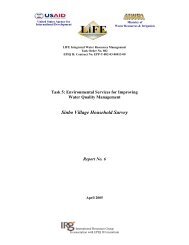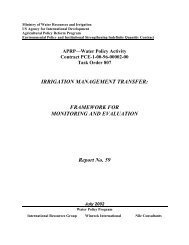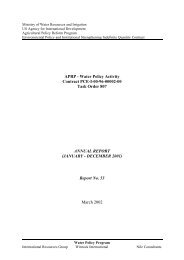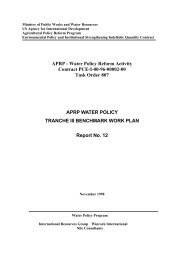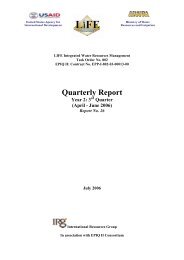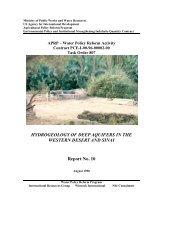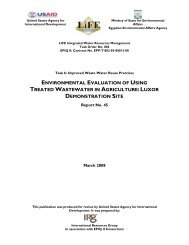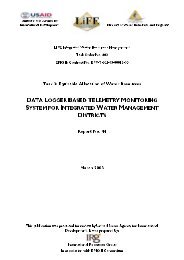APRP - Water Policy Reform - LIFE-IWRMII Project, Egypt
APRP - Water Policy Reform - LIFE-IWRMII Project, Egypt
APRP - Water Policy Reform - LIFE-IWRMII Project, Egypt
- No tags were found...
You also want an ePaper? Increase the reach of your titles
YUMPU automatically turns print PDFs into web optimized ePapers that Google loves.
Mediterranean Sea for sustainable salinity balance or minimum outflows for sustainabilityof the ecosystems of the northern lakes for fisheries production, 2) drain water quality andthe impacts (particularly of pathogens and heavy metals) of municipal and industrialwastes and other pollutants (pesticides) on agricultural productivity and the health of<strong>Egypt</strong>ian farmers in the Delta, 3) alternative reuse approaches as opposed to thecentrally planned and operated large mixing pump stations, 4) impacts of reclamationprojects like El Salam Canal which have been planned to be fed (in a certain proportion)by agricultural drain water, 5) “unofficial” drain water reuse which is occurring all over theDelta, 6) institutional aspects of drainage water management, 7) impacts of new irrigationtechnologies on drainage water generation, 8) impacts of the aging drain system,inadequate maintenance, renovation needs, 9) drainage system privatization at somelevel and formation/involvement of drainage user associations or irrigation and drainageassociations.The group has conducted two field trips to the east and middle Delta areas to meet firsthand with field officials responsible for drainage water reuse planning and operations.The first field trip was to Sharkia and East Dakhlia Governorates. Monitoring data andvisual observations indicate the quality of drainage water in the area is getting worse dueto sewage effluent and industrial discharges directly into the main drains. Large areas ofrice are irrigated in this area primarily with drain water. Once the Salam canal beginstaking its planned share of drain water these areas will suffer from lack of water. Thesecond field trip was to Qalubia, Gharbia and West Dakhlia Governorates.The drain water reuse work group has prepared a draft collection of written analyticmaterial. The strategic topics addressed are summarized here:• maximum reuse potential and minimum outflows• municipal and industrial wastewaters in the Delta• drainage water quality in the Delta• impacts of IIP and other new irrigation technologies on drain water generation• centralized and intermediate drainage water reuse• impacts of Salam Canal and Toshka projects on drain water in the Delta• institutional aspects of drainage water reuse• long term economic aspects and policy development regarding drainage waterNational Strategy for Irrigation ImprovementsThis work group, also called the IIP work group, is led by Dr. Thomas Ley. The group hascollected and reviewed over 50 background documents and reports regarding the USAIDfundedIIP program. Field trips have been made to 4 IIP pilot areas in the Delta and NileValley. In each case local IIP and IAS staff have been interviewed about the program, itsaccomplishments, problems and issues. Farmers and WUA leaders at each site werealso interviewed regarding the same topics. <strong>Project</strong> sites visited include some of the bestperforming sites and some of the most problematic sites. Field visits have also beenmade to the World Bank supported IIP sites, where discussions were conducted withvarious experts working with the World Bank IIP program. Field trips to areas sufferingirrigation water shortages and distribution problems, such as parts of the Nile Valley justupstream of Cairo and some of the old new lands were also made.The assessment of IIP and development of a national strategy for irrigation improvementsis being conducted within a broader scope which is inclusive of several elements of theEPIQ water policy reform work plan. Improving the productivity and utilization of <strong>Egypt</strong>’swater resources, with a focus on the agriculture sector, means improving the11


